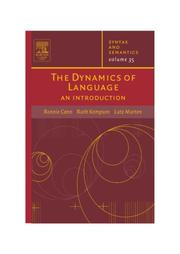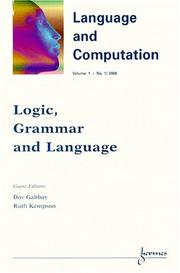| Listing 1 - 10 of 10 |
Sort by
|
Book
ISBN: 0521099382 0521207339 9780521207331 Year: 1975 Volume: 15 Publisher: Cambridge: Cambridge university press,
Abstract | Keywords | Export | Availability | Bookmark
 Loading...
Loading...Choose an application
- Reference Manager
- EndNote
- RefWorks (Direct export to RefWorks)
Lexicology. Semantics --- Semantics --- Presupposition (Logic) --- Sémantique --- Présupposition (Logique) --- #KVHA:Taalkunde --- #KVHA:Semantiek --- #KVHA:Pragmatiek --- #KVHA:Vooronderstelling --- 801.56 --- Formal semantics --- Semasiology --- Semiology (Semantics) --- Comparative linguistics --- Information theory --- Language and languages --- Lexicology --- Meaning (Psychology) --- Language and logic --- Logic --- Syntaxis. Semantiek --- Semantics. --- 801.56 Syntaxis. Semantiek --- Presupposition (Logic). --- Sémantique --- Présupposition (Logique) --- Sémantique. --- Présupposition (logique)

ISBN: 0521292093 0521216133 9780521292092 9780521216135 Year: 1977 Publisher: Cambridge: Cambridge university press,
Abstract | Keywords | Export | Availability | Bookmark
 Loading...
Loading...Choose an application
- Reference Manager
- EndNote
- RefWorks (Direct export to RefWorks)
Languages --- -Semantics (Philosophy) --- 801.56 --- Intension (Philosophy) --- Logical semantics --- Semantics (Logic) --- Semeiotics --- Significs --- Syntactics --- Unified science --- Foreign languages --- 801.56 Syntaxis. Semantiek --- Syntaxis. Semantiek --- Philosophy --- Language and languages --- Semantics --- Semantics (Philosophy) --- Logic, Symbolic and mathematical --- Logical positivism --- Meaning (Psychology) --- Philosophy, Modern --- Semiotics --- Signs and symbols --- Symbolism --- Analysis (Philosophy) --- Definition (Philosophy) --- Formal semantics --- Semasiology --- Semiology (Semantics) --- Comparative linguistics --- Information theory --- Lexicology --- Lexicology. Semantics --- Semantics. --- Philosophy. --- Semantics (Philosophy). --- Sémantique --- Sémantique (Philosophie) --- Langage et langues --- Philosophie --- Anthropology --- Communication --- Ethnology --- Philology --- Linguistics --- Language and languages - Philosophy. --- Language and languages - Philosophy
Book
ISBN: 0521342511 Year: 1988 Publisher: Cambridge : Cambridge university press,
Abstract | Keywords | Export | Availability | Bookmark
 Loading...
Loading...Choose an application
- Reference Manager
- EndNote
- RefWorks (Direct export to RefWorks)
Cognition --- Psychology --- #A9107G --- Cognitive psychology --- Psycholinguistics --- Cognition. --- Psycholinguistics. --- Psycholinguistique --- Language, Psychology of --- Language and languages --- Psychology of language --- Speech --- Psychological aspects --- Linguistics --- Thought and thinking
Book
ISBN: 052139905X Year: 1990 Publisher: Cambridge Cambridge University Press
Abstract | Keywords | Export | Availability | Bookmark
 Loading...
Loading...Choose an application
- Reference Manager
- EndNote
- RefWorks (Direct export to RefWorks)
Book
Year: 1975 Publisher: London, New York, Melbourne Cambridge University Press
Abstract | Keywords | Export | Availability | Bookmark
 Loading...
Loading...Choose an application
- Reference Manager
- EndNote
- RefWorks (Direct export to RefWorks)
Book
Year: 1977 Publisher: Cambrige University Press
Abstract | Keywords | Export | Availability | Bookmark
 Loading...
Loading...Choose an application
- Reference Manager
- EndNote
- RefWorks (Direct export to RefWorks)
Book
ISBN: 9780521819626 0521819628 9780521525664 0521525667 Year: 2009 Volume: *64 Publisher: Cambridge: Cambridge University Press,
Abstract | Keywords | Export | Availability | Bookmark
 Loading...
Loading...Choose an application
- Reference Manager
- EndNote
- RefWorks (Direct export to RefWorks)
The study of meaning in language has developed dramatically over the last fifty years. Semantics is distinctive as it not only presents a general introduction to the topic, including the most recent developments, but it also provides a unique perspective for addressing current issues. It opens by introducing readers to the study of logic (natural deduction) as the background against which developments have taken place. This demonstrates the link between semantics and the study of reasoning and how this view can provide new solutions to the puzzles that have plagued the approaches presented in other textbooks. The major subject areas of semantics are discussed, including quantification, anaphora and discourse, tense and aspect, ellipsis and context, and word meaning. The book also presents state-of-the-art research in topics at the forefront of semantics.
Lexicology. Semantics --- Semantics --- Formal semantics --- Semasiology --- Semiology (Semantics) --- Comparative linguistics --- Information theory --- Language and languages --- Lexicology --- Meaning (Psychology) --- Semantiek --- 801.56 --- Syntaxis. Semantiek --- 801.56 Syntaxis. Semantiek --- Semantiek. --- Sémantique --- Manuels d'enseignement supérieur

ISBN: 0080456774 1849508739 9780080456775 9781849508735 9780126135350 0126135355 0126135363 9780126135367 0126135355 9780126135367 Year: 2005 Publisher: Amsterdam Oxford Elsevier
Abstract | Keywords | Export | Availability | Bookmark
 Loading...
Loading...Choose an application
- Reference Manager
- EndNote
- RefWorks (Direct export to RefWorks)
For the whole of the last half-century, most theoretical syntacticians have assumed that knowledge of language is different from the tasks of speaking and understanding. There have been some dissenters, but, by and large, this view still holds sway. This book takes a different view: it continues the task set in hand by Kempson et al (2001) of arguing that the common-sense intuition is correct that knowledge of language consists in being able to use it in speaking and understanding. The Dynamics of Language argues that interpretation is built up across as sequence of words relative to some context and that this is all that is needed to explain the structural properties of language. The dynamics of how interpretation is built up is the syntax of a language system. The authors' first task is to convey to a general linguistic audience with a minimum of formal apparatus, the substance of that formal system. Secondly, as linguists, they set themselves the task of applying the formal system to as broad an array of linguistic puzzles as possible, the languages analysed ranging from English to Japanese and Swahili. It argues that knowledge in language consists of being able to use it in speaking and understanding. It analyses a variety of languages, from English to Japanese and Swahili. It appeals to a wide audience in the disciplines of language, linguistics, anthropology, education, psychology, cognitive science, law, media studies, and medicine.
Language and languages --- Linguistics. --- Language Arts & Disciplines --- Syntaxis. --- Semantische interpretatie. --- Philosophy. --- Linguistics --- General.

Abstract | Keywords | Export | Availability | Bookmark
 Loading...
Loading...Choose an application
- Reference Manager
- EndNote
- RefWorks (Direct export to RefWorks)

ISBN: 0631176136 Year: 2001 Publisher: Oxford : Blackwell,
Abstract | Keywords | Export | Availability | Bookmark
 Loading...
Loading...Choose an application
- Reference Manager
- EndNote
- RefWorks (Direct export to RefWorks)
Grammar --- Analyse linguistique (Linguistique) --- Linguistic analysis (Linguistics) --- Taalanalyse (Taalwetenschap) --- 801.56 --- Grammar, Comparative and general --- -Linguistic analysis (Linguistics) --- Comparative grammar --- Grammar, Philosophical --- Grammar, Universal --- Language and languages --- Philosophical grammar --- Linguistics --- Philology --- Analysis, Linguistic (Linguistics) --- Analysis (Philosophy) --- Syntaxis. Semantiek --- Syntax --- Grammar, Comparative --- Syntax. --- 801.56 Syntaxis. Semantiek --- Linguistic analysis (Linguistics). --- Grammar [Comparative and general ] --- Grammar, Comparative and general Syntax
| Listing 1 - 10 of 10 |
Sort by
|

 Search
Search Feedback
Feedback About UniCat
About UniCat  Help
Help News
News